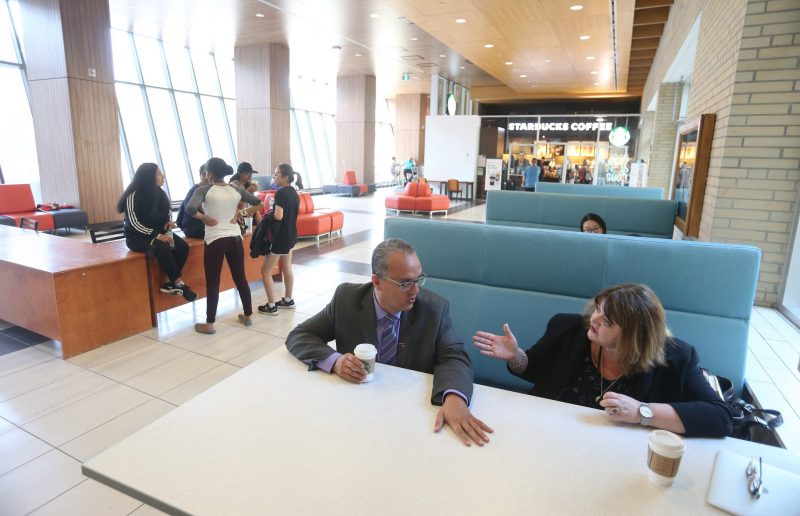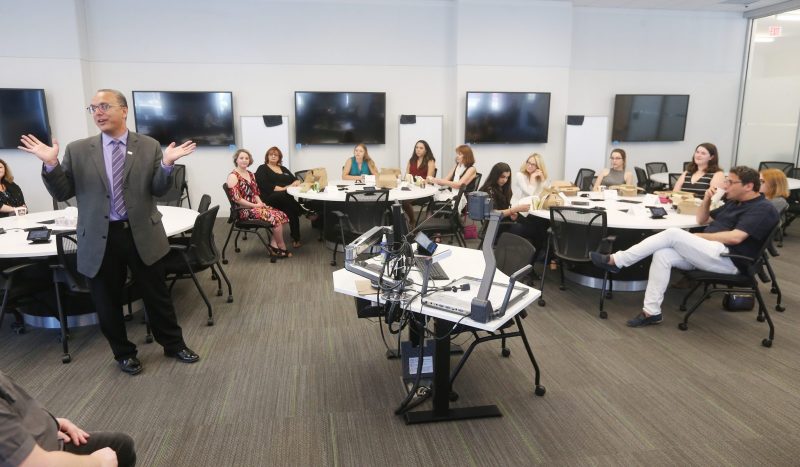How to save the humanities? Make them a requirement toward a business degree

Pearl Bakhtiari majors in philosophy and minors in French, a decision she concedes makes relatives and friends ask, “How will you find a job?”
HAMILTON, Ontario — On a sun-splashed quadrangle suffused with the enthusiasm of a new semester, Pearl Bakhtiari sat cross-legged on the grass and made a passionate case for her major in philosophy and minor in French.
“Our world is becoming more black and white every day,” said Bakhtiari, a third-year student here at McMaster University near Toronto. “The humanities add some color into that.”
She admitted that her choice of academic disciplines elicited anxiety from relatives and friends concerned about more practical issues, however.
“People are, like, ‘You’re studying what? How will you find a job?’”
It’s a fast-spreading skepticism that has resulted in significant drops in the number of students majoring in the humanities on both sides of the U.S.-Canadian border.
At stake is not only whether people will be able to interpret Shakespeare, say advocates of subjects including English, history, language, philosophy, and the visual and performing arts. It’s the essential skills they say these fields teach, and that focus groups suggest employers want.
The proportion of students who major in the humanities has fallen from a high of nearly one in five to one in 20.
Now, after four years of planning, a new program at McMaster’s DeGroote School of Business proposes to make this connection more concrete. It’s a business major aimed at turning out what it says will be future corporate leaders, for which students also are required to take philosophy, language, culture and other humanities courses toward an eventual degree in business.
“We did the research about what employers are looking for and we kept coming back to the same things: critical thinking, communication, cultural perspective,” said Emad Mohammad, the director of the new program, called Integrated Business and Humanities. “But the School of Business couldn’t teach these skills. We didn’t have the in-house expertise to teach philosophy and history and English.”
It found a willing partner in the humanities department, which had been pushing the same idea for so long that Dean of Humanities Ken Cruikshank said the plan had been sitting in a drawer for nearly 20 years.
“When the business dean came in here to say he wanted to do this, I laughed and went to a file and said, ‘Here you go,’” Cruikshank said, blowing the dust off an imaginary document.
Such long-sought partnerships are serious matters and important potential lifelines for humanities faculties, including at McMaster, that are struggling to prove their relevance in the face of big enrollment declines.

Accounting and financial management professor Emad Mohammad and linguistics and languages professor Anna Moro came together from their separate academic worlds to create a combined program in business and humanities at McMaster University near Toronto.
The proportion of students who major in the humanities in the United States has fallen from a high of nearly one in five in the late 1960s to one in 20 in 2015, the last year for which the figure is available, according to the American Academy of Arts and Sciences.
The trend is similar in Canada, where humanities enrollment plummeted by more than 5 percent — the biggest drop of any discipline — in just the one year ending in 2015, also the most recent period available, and where the share of students majoring in the humanities is an equally low one in 20, the government agency Statistics Canada reports
“It’s pressure from parents. ‘There are no jobs.’ You name it,” said Anna Moro, a linguistics and languages professor who teamed up with Mohammad to design the new program.
Even the outside experts who reviewed the Integrated Business and Humanities program for accreditation purposes, including a member of the McMaster sociology department, unanimously recommended dropping the word “humanities” from the name. (Backers fought for it, saying the incorporation of the humanities was the very thing that made their approach to business different.) And while the target for the first class was 80 students, only 51 signed on.
As associate dean of humanities, Moro is responsible for the challenging job of recruiting humanities majors. While many young prospects are attracted to the humanities, she said, “It was the parents who came to the recruitment events who were saying, ‘We’re going to check out nursing or engineering.’”
At a time of spiraling tuition, conceded Moro, it’s gotten harder to justify a major without an evident immediate financial benefit. Those parents “are worried about the economic and overall well-being of their children,” she said.

Emad Mohammad, director of the Integrated Business and Humanities program, welcomes the first students, at a reception also attended by professors who teach such disciplines as classics and philosophy. Mohammad says research found employers wanted skills taught by humanities courses the business school couldn’t offer on its own.
They’re not entirely wrong. Right out of college, humanities majors in the United States earn an average of $5,000 a year less than professionals and pre-professionals, according to the National Center for Higher Education Management Systems and the Association of American Colleges & Universities, or AAC&U, which represents liberal-arts colleges. And while they catch up to and pull slightly ahead of those groups by the time they reach their 40s, they still make less over the course of their careers than engineers and people with degrees in the physical and natural sciences and math. In Canada, graduates from some humanities programs make half or less than half of what engineers and people with degrees in business administration earn, StatsCan found.
But these figures overlook the importance of the humanities as a foundation for all kinds of jobs, said Moro. “They miss the point that in the long run it’s the people with the liberal arts backgrounds who end up being CEOs,” she said.
Employers highly value what humanities majors learn in college, focus groups and surveys show. More than nine out of 10 say a job candidate’s capacity for thinking and communicating clearly and solving complex problems is more important than his or her major, according to an AAC&U poll. More than three-quarters favor applicants who understand other cultures.
“People are, like, ‘You’re studying what? How will you find a job?’”
As the humanities decline, business has become the largest undergraduate major. But a Carnegie Foundation report found that undergraduate business education is narrow and doesn’t challenge students to think creatively or ask important questions. (Carnegie is among the funders of The Hechinger Report, which produced this story.)
Students in the new McMaster program will be required to take a course from humanities faculty called “Insight and Inquiry: Questions to Change to World” and use what they learn to determine what data to collect and analyze for their accounting courses.
They’ll cover “Sentence and Communication Structure in Modern English” and “Language and Society” to closely parse financial statements and earnings reports.
They’ll consider the varying humanities and business definitions of the word “value,” Mohammad said, citing as an example the short-term benefit but long-term cost of development patterns in Houston that may have exacerbated damage from Hurricane Harvey, or the seeming savings but social consequences of importing manufactured goods from China. Requiring business majors to take such courses could help revive public interest in the humanities. At the very least, to hear Moro and Mohammad tell it, it gives cover to people who still aspire to study subjects like those.

Astara Truman overcame her family’s resistance to majoring in the humanities and convinced them that the new Integrated Business and Humanities degree at McMaster University near Toronto would help her realize her dream of opening a vegan restaurant. “You want to think in a different way,” says Truman.
“I want students to calm their parents’ fears and say, ‘I’ll take philosophy, but I’ll also take business,’” Moro said.
When she went to college in the 1960s, said Elisabeth Gedge, who teaches philosophy at McMaster, students “were idealistic, and studied for the love of it.” Now, Gedge said, as the price of education has increased, “we need to be accountable to those who pay our wages.”
That means doing a better job of explaining the practical benefits of studying such things as philosophy, she said. “Whatever job you’re in you’re going to have to make a case for something. You have to be able to rally the arguments and think through the consequences. That’s what philosophy teaches you.”
Interdisciplinary alliances have come to comprise a fast-growing trend for entrepreneurial humanities departments. McMaster already offers a specialized minor in commerce for humanities majors, and its Justice and Political Philosophy and Law program, in which Bakhtiari is enrolled, often leads to law school. In the United States, Mount Holyoke College combines the liberal arts with the hot field of data science, including by using quantitative analysis to study literature written by women.
Franklin & Marshall College is working with Bucknell University and the University of Pennsylvania’s Wharton School to find more ways that the liberal arts can be applied to business education. The project looks at such things as how fiction can help explore sustainable business and what a dance instructor can teach about entrepreneurship.
“I think this is honestly the wave of the future,” said Gloria Larson, president of Bentley University, whose curriculum fuses business and the liberal arts and a fifth of whose students double-major in business and liberal studies.
“There’s no excuse for not putting these pieces together,” said Larson, author of the new book Prepared U: How Innovative Colleges Drive Student Success. “You want to have graduates who are educated not just trained.”
That also requires the humanities to show that “what we do in the academy matters,” said AAC&U President Lynn Pasquerella, former president of Mount Holyoke. “We have to be thinking collaboratively.”

Ryan Sommer wants to be an entrepreneur and thinks studying the humanities along with business will make it easier for him to figure things out for himself than it is for students in conventional business programs.
As for faculty who teach humanities, what they mostly need is people in their classes. “There’s a pressure to cut certain programs that are not profitable because your revenues are based on your enrollment,” Moro said. “Faculties of arts have to justify their existence.”
Including to governors and legislators, who have proposed charging higher tuition for “non-strategic majors” such as history and English (Florida) or eliminating programs altogether that may not lead directly to employment (North Carolina) or to high-paying jobs that are in demand (Kentucky).
As a Republican presidential candidate, Sen. Marco Rubio of Florida questioned whether it was worth providing loans for students “to study, you know — I don’t want to offend anybody — Roman history. Are there any Romans here?” A Trump campaign advisor suggested giving preference for such loans to majors in fields such as engineering, with higher earnings, over disciplines including the humanities.
Since 2007, the American Academy of Arts & Sciences reports, four-year universities have reduced their number of departments offering art history, English, languages, history, linguistics, literature and religion.
When he told the provost of the plan to merge philosophy, language, history, culture and other disciplines with business, said Mohammad, who is also chair of accounting and financial management, “He said, ‘Well, I’m glad to see you’re helping the humanities.’”
So are the students in the inaugural class, who were filing into a welcoming reception across the campus from where Bakhtiari was philosophizing on the quad.
“Your standard business program is going to give you a lot of knowledge. It probably prepares you really well to go work for a corporation,” said one, Ryan Sommer. But Sommer wants to be an entrepreneur, and said he needs to figure things out for himself. Students who don’t have the benefit of humanities educations will likely be able to do that, too, he said. “It will just take them longer.”

Yael Morris got a scholarship that covers about half of her tuition in the new Integrated Business and Humanities program at McMaster University near Toronto, endowed by a McMaster alumnus who majored in music and went on to work on Wall Street after earning a Harvard MBA. She says the humanities will help her learn how people from different cultures interact.
Yael Morris said she wants to learn about doing business across cultures. “In [conventional] business programs there’s not enough about how people interact, and that’s what makes the world work,” said Morris, who is enrolled in the new program with help from a $4,000 scholarship toward the annual $8,640 tuition, endowed by a McMaster alumnus who majored in music and went on to work on Wall Street after earning a Harvard MBA. (Both figures have been converted into U.S. dollars.)
And Astara Truman overcame her family’s resistance to majoring in the humanities and convinced them that the Integrated Business and Humanities degree would help her realize her dream of opening a vegan restaurant.
“My parents said the same thing: “What would you do with just a humanities degree?’ It’s not viewed as being useful,” Truman said. But combining business with her love of philosophy that began in high school, she said, will help her eventually run her restaurant the way she wants to.
“You want to think,” said Truman, “in a different way.”
The post How to save the humanities? Make them a requirement toward a business degree appeared first on The Hechinger Report.
Last Updated on 18 August 2024
We cover inequality and innovation in education with in-depth journalism that uses research, data and stories from classrooms and campuses to show the public how education can be improved and why it matters.





